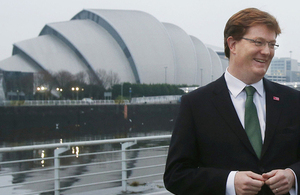Scottish Independence Referendum: myths must be debunked
Chief Secretary Danny Alexander will say in a keynote speech to business leaders in Edinburgh that Independence White Paper myths must be debunked.

It is time to debunk the calculations and claims that have been put forward by the Scottish government in this referendum, Chief Secretary Danny Alexander will say in a keynote speech to business leaders in Edinburgh today (30 April).
Speaking on the day of publication by HMRC of new oil revenue data and ahead of publication of the government’s most comprehensive analysis of the fiscal consequences of separation yet, the Chief Secretary will challenge some of the myths perpetuated by nationalists and call on the Scottish Government to be honest with people about the cost of independence.
He will also call on the Scottish Government – and Finance Secretary John Swinney – to publish revised and realistic forecasts of oil and gas revenues.
Danny Alexander will say:
The nationalists’ assertions on Scotland’s finances are at best ill-informed and at worst, deeply misleading to Scottish voters. The fact is that their £1.5 trillion figure for the value of oil left in the North Sea doesn’t include any costs for getting the oil out of the ground and into the petrol pump.
Over the whole 5 year period of the Scottish government’s Oil and gas bulletin [2012 to 2017], their most cautious forecast for Scottish oil and gas revenues is £41 billion. Yet the independent Office for Budget Responsibility forecasts that whole UK revenues will be just £25 billion over the same period. It doesn’t matter how deep you drill into the figures, they simply don’t add up. The indisputable point is that we are better off together.
It is time for the Scottish Government to confirm what we all know: that the White Paper was wrong, to correct the discredited Oil and gas bulletin and the errors at the heart of the White Paper. The Scottish government must confront the fact that it is promising tax revenues and public spending that it cannot deliver. It should revise its oil and gas forecasts or better yet, follow international best practice and follow an independent forecast like the OBR’s. It is the very least that the Scottish voters deserve.
On the myths perpetuated about independence, Mr Alexander will say:
It’s perhaps true that the Referendum campaign here in Scotland hasn’t provided many laughs so far and given both the enormity – and the irreversibility – of the choice we face, that is perfectly understandable. But as the campaign continues, when it comes to some of the statements and assertions made by nationalists, you really do need a sense of humour.
On some of the basic financial assumptions made in the White paper, he will say that the nationalists ‘ignore the reality, that when the financial crisis hit, it was the government of the United Kingdom that stepped in to recapitalise RBS and HBOS and the taxpayers of the United Kingdom that extended £275 billion of total support to RBS alone’.
On currency, he will challenge the:
Continued, belligerent, assertion that Scotland could – and would – keep the pound. Alex Salmond has to face up to the fact that the rest of the UK does not have to – and would not want to – continue to share the credit card.
And on UK institutions, he will say:
There is also the fantastical claim, made in the White Paper that an independent Scotland would share a third of the UK’s institutions and services despite the fact that this is completely unprecedented anywhere in the world. This is a claim we have to listen to whenever an institution crops up that the nationalists haven’t had time to think about. So it won’t surprise me if next Saturday night Alex Salmond declares that an independent Scotland will share the UK’s automatic place in the final of the Eurovision Song Contest!
The Treasury’s forthcoming fiscal analysis will set out the benefits of the UK and the costs of independence. In the absence of any detailed costings from the Scottish government, Treasury economists have spent months analysing data and forecasts and consulting with independent bodies to calculate in detail the figures that illustrate the benefits of the UK and the cost of independence.
The analysis will be published in coming weeks and will set out in more detail than ever before the impact of having to absorb higher spending and lower tax within Scotland alone, and exacerbated by declining oil revenues and an ageing population. It will look at the Scottish government’s uncosted policy pledges and the set up costs of independence within a much smaller budget. It will come on top of detailed analysis already published by the IFS and others and a secret paper leaked last year written by the Finance Minister John Swinney forecasting a similar challenge.